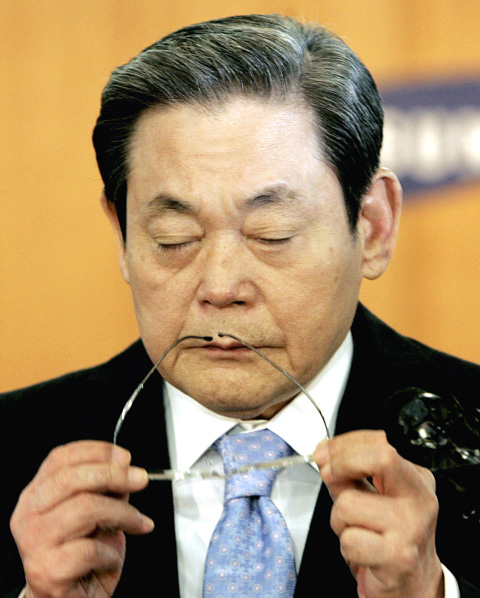Embattled Samsung Group chairman Lee Kun-hee said yesterday he was stepping down from his post at the top of South Korea’s biggest conglomerate following his indictment on tax evasion charges.
“I today have decided to resign from the post of chairman of Samsung,” Lee told a news conference less than one week after he was indicted following a special independent counsel investigation into the conglomerate’s operations.
Lee took over the reins of Samsung two decades ago following the death of his father, the conglomerate’s founder. He is one of South Korea’s richest people and is widely regarded as its most influential business executive.

PHOTO: AP
Samsung Group has interests in dozens of businesses including electronics, shipbuilding and construction. Its companies account for up to 20 percent of South Korea’s exports, some estimates said.
Samsung Electronics, its flagship corporation, is a world leader in computer chips, flat-screen TVs and mobile phones. Lee is widely seen as the driving force behind its rise into a global technology force.
“We, including myself, have caused troubles to the nation with the special probe,” Lee said. “I deeply apologize for that and I’ll take full responsibility for everything, both legally and morally.”
After Lee spoke, vice chairman Lee Hak-soo, considered the chairman’s closest confidante, also announced his resignation as well as that of Lee Jae-yong, the chairman’s son and heir who is an executive at Samsung Electronics Co.
Lee, the vice chairman, said that Lee Soo-bin, chairman of Samsung Life Insurance, would be representing Samsung Group externally. It was not immediately clear if the post of group chairman would remain vacant or eventually be filled.
“I think there will be a pretty serious impact to the group,” Yim Jun-seok, a Samsung spokesman, told reporters after Lee’s resignation. He didn’t elaborate.
Special prosecutors last Thursday indicted Lee on charges of evading 112.8 billion won (US$113 million) in taxes, ending a three-month probe in the family-run conglomerate prompted by allegations of wrongdoing by a former Samsung lawyer.
Prosecutors, however, dismissed the most explosive claim — that Samsung used affiliates to raise a slush fund to bribe influential South Koreans — for lack of evidence.
Samsung Group is characterized by a complex ownership structure based on a web of cross-shareholdings by group companies — some unlisted. Lee’s father founded the conglomerate 70 years ago.
They also indicted Lee without arrest, saying his apprehension was too big a risk for South Korea, citing “the extremely competitive global economic situation.”
Lee hinted earlier this month that he might resign over the scandal following questioning by the special prosecutors.
Besides Lee, nine other Samsung executives were indicted last week.
Samsung also announced it would eliminate its Strategic Planning Office, long a lightning rod for critics who say the conglomerate’s management structure is too opaque.

MORE VISITORS: The Tourism Administration said that it is seeing positive prospects in its efforts to expand the tourism market in North America and Europe Taiwan has been ranked as the cheapest place in the world to travel to this year, based on a list recommended by NerdWallet. The San Francisco-based personal finance company said that Taiwan topped the list of 16 nations it chose for budget travelers because US tourists do not need visas and travelers can easily have a good meal for less than US$10. A bus ride in Taipei costs just under US$0.50, while subway rides start at US$0.60, the firm said, adding that public transportation in Taiwan is easy to navigate. The firm also called Taiwan a “food lover’s paradise,” citing inexpensive breakfast stalls

TRADE: A mandatory declaration of origin for manufactured goods bound for the US is to take effect on May 7 to block China from exploiting Taiwan’s trade channels All products manufactured in Taiwan and exported to the US must include a signed declaration of origin starting on May 7, the Bureau of Foreign Trade announced yesterday. US President Donald Trump on April 2 imposed a 32 percent tariff on imports from Taiwan, but one week later announced a 90-day pause on its implementation. However, a universal 10 percent tariff was immediately applied to most imports from around the world. On April 12, the Trump administration further exempted computers, smartphones and semiconductors from the new tariffs. In response, President William Lai’s (賴清德) administration has introduced a series of countermeasures to support affected

CROSS-STRAIT: The vast majority of Taiwanese support maintaining the ‘status quo,’ while concern is rising about Beijing’s influence operations More than eight out of 10 Taiwanese reject Beijing’s “one country, two systems” framework for cross-strait relations, according to a survey released by the Mainland Affairs Council (MAC) on Thursday. The MAC’s latest quarterly survey found that 84.4 percent of respondents opposed Beijing’s “one country, two systems” formula for handling cross-strait relations — a figure consistent with past polling. Over the past three years, opposition to the framework has remained high, ranging from a low of 83.6 percent in April 2023 to a peak of 89.6 percent in April last year. In the most recent poll, 82.5 percent also rejected China’s

PLUGGING HOLES: The amendments would bring the legislation in line with systems found in other countries such as Japan and the US, Legislator Chen Kuan-ting said Democratic Progressive Party (DPP) Legislator Chen Kuan-ting (陳冠廷) has proposed amending national security legislation amid a spate of espionage cases. Potential gaps in security vetting procedures for personnel with access to sensitive information prompted him to propose the amendments, which would introduce changes to Article 14 of the Classified National Security Information Protection Act (國家機密保護法), Chen said yesterday. The proposal, which aims to enhance interagency vetting procedures and reduce the risk of classified information leaks, would establish a comprehensive security clearance system in Taiwan, he said. The amendment would require character and loyalty checks for civil servants and intelligence personnel prior to